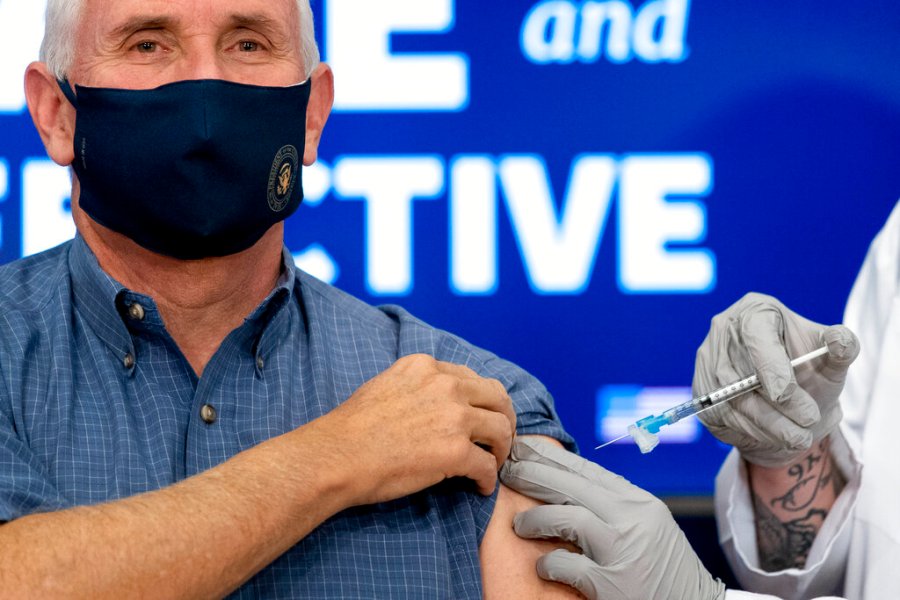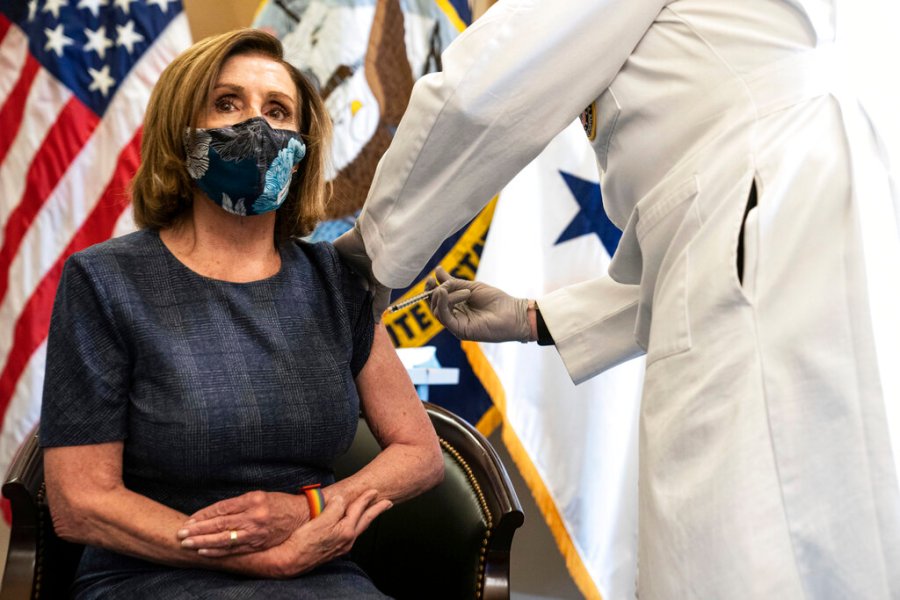WASHINGTON (NewsNation Now) — President-elect Joe Biden received his first dose of the coronavirus vaccine on live television Monday as part of a growing effort to convince the American public the inoculations are safe.
The president-elect took a dose of Pfizer vaccine at a hospital not far from his Delaware home, hours after his wife, Jill Biden, did the same. The injections came the same day that a second vaccine, produced by Moderna, will start arriving in states. It joins Pfizer’s in the nation’s arsenal against the COVID-19 pandemic, which has now killed more than 317,000 people in the United States and upended life around the globe.
“I’m ready,” said Biden, who was administered the dose at a hospital in Newark, Delaware. The president-elect rolled the left sleeve of his turtleneck all the way up to his shoulder, then declined the option to count to three before the needle was inserted into his left arm.
“You just go ahead anytime you’re ready,” he told the nurse practitioner who administered the shot.
Biden emphasized the safety of the vaccine, and said President Donald Trump’s administration “deserves some credit” for getting the vaccine distribution process “off the ground.”
“I’m doing this to demonstrate that people should be prepared when it’s available to take the vaccine,” he added. “There’s nothing to worry about.”
He noted, however, that distributing the vaccine is “going to take time,” and urged Americans to take precautions during the holiday season to avoid the spread of the virus, including wearing masks.
“If you don’t have to travel, don’t travel,” he said. “It’s really important.”
Biden also thanked health care workers, and offered praise and an elbow bump to Tabe Mase, the nurse practitioner who administered his first dose of the vaccine.
Monday’s event came the same day that a second vaccine, produced by Moderna, started arriving in states, joining Pfizer’s in the nation’s arsenal against the COVID-19 pandemic, which has now killed more than 317,000 people in the United States and upended life around the globe.
“I don’t want to get ahead of the line, but I want to make sure we demonstrate to the American people that it is safe to take,” Biden has said of his decision. Biden and his wife, Jill, will also thank health care workers at the facility where they receive the shots, his incoming press secretary has said.

Top government officials last week joined the first Americans to be inoculated against COVID-19 as part of the largest largest vaccination campaign in the nation’s history.
Vice President Mike Pence, House Speaker Nancy Pelosi, D-Calif., Senate Majority Leader Mitch McConnell, R-Ky., and other lawmakers were given doses Friday. They chose to publicize their injections as part of a campaign to convince Americans that the vaccines are safe and effective amid skepticism, especially among Republicans.
Alex Azar, the Secretary of the U.S. Department of Health & Human Services, said he will receive the vaccine on Tuesday, along with Dr. Anthony Fauci and other federal health officials.
Vice President-elect Kamala Harris and her husband are expected to receive their first shots next week.

President Donald Trump has not said when he intends to get the shot. He tweeted earlier this month that he was “not scheduled” to take it, but said he looked “forward to doing so at the appropriate time.”
The White House has said he is still discussing timing with his doctors.
Trump was hospitalized with COVID-19 in October and given an experimental monoclonal antibody treatment that he credited for his swift recovery. A Centers for Disease Control and Prevention advisory board has said people who received that treatment should wait at least 90 days to be vaccinated to avoid any potential interference.

“When the time is right, I’m sure he will remain willing to take it,” White House spokesperson Brian Morgenstern echoed Friday. “It’s just something we’re working through.”
White House press secretary Kayleigh McEnany, however, offered a different explanation for the delay. She told reporters last week that Trump was holding off, in part, “to show Americans that our priority are the most vulnerable.”
“The President wants to send a parallel message, which is, you know, our long-term care facility residents and our frontline workers are paramount in importance, and he wants to set an example in that regard,” she said.
The CDC’s Advisory Committee on Immunization Practices has said the Pfizer-BioNTech vaccine, which was the first to receive authorization, “is safe and likely efficacious” for people who have been infected with COVID-19 and “should be offered regardless of history of prior symptomatic or asymptomatic SARS-CoV-2 infection.”
While there is no recommended minimum wait time between infection and vaccination, because reinfection is uncommon in the three months after a person is infected, the committee said people who tested positive in the preceding 90 days “may delay vaccination until near the end of this period, if desired.”
“Currently, there are no data on the safety and efficacy of Pfizer-BioNTech COVID-19 vaccination in persons who received monoclonal antibodies or convalescent plasma as part of COVID-19 treatment,” they wrote, recommending that vaccination “be deferred for at least 90 days, as a precautionary measure until additional information becomes available, to avoid interference of the antibody treatment with vaccine-induced immune responses.”
Surgeon General Jerome Adams cited that recommendation on CBS’s “Face the Nation” on Sunday when asked if Trump planned to receive the shot on camera.
“From a scientific point of view, I will remind people that the president has had COVID within the last 90 days. He received the monoclonal antibodies. And that is actually one scenario where we tell people maybe you should hold off on getting the vaccine, talk to your health provider to find out the right time,” Adams said.
But others, including Dr. Anthony Fauci, the nation’s top infectious diseases expert, have recommended that Trump be vaccinated without delay.
